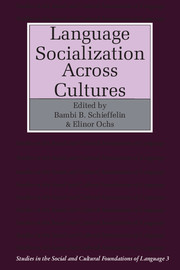Book contents
- Frontmatter
- Contents
- List of contributors
- 1 Introduction
- Part I Acquiring language and culture through interactional routines
- Part II Acquiring knowledge of status and role through language use
- Part III Expressing affect: input and acquisition
- 8 Teasing and shaming in Kaluli children's interactions
- 9 Teasing: verbal play in two Mexicano homes
- 10 Teasing as language socialization and verbal play in a white working-class community
- 11 The acquisition of communicative style in Japanese
- 12 From feelings to grammar: a Samoan case study
- Index
12 - From feelings to grammar: a Samoan case study
Published online by Cambridge University Press: 05 June 2012
- Frontmatter
- Contents
- List of contributors
- 1 Introduction
- Part I Acquiring language and culture through interactional routines
- Part II Acquiring knowledge of status and role through language use
- Part III Expressing affect: input and acquisition
- 8 Teasing and shaming in Kaluli children's interactions
- 9 Teasing: verbal play in two Mexicano homes
- 10 Teasing as language socialization and verbal play in a white working-class community
- 11 The acquisition of communicative style in Japanese
- 12 From feelings to grammar: a Samoan case study
- Index
Summary
Introduction
In 1822, after traveling throughout the Pacific, the Reverends Tyerman and Bennett reported a certain problem that many Christian families were experiencing. Writing to London, they referred to the head of one such family:
As a Christian parent, he [Mr. Chamberlain] is naturally very anxious to preserve the minds of his offspring from the moral contamination to which they are liable from the inevitable exposure to the society (occasionally at least) of native children of their own ages, whose language they understand, and whose filthy talk they cannot but hear at times. The abominable conversation (if such it may be called) of infants as soon as they begin to lisp out words, is such a jargon of grossness and obscenity as could not be imagined by persons brought up even in those manufacturing towns of our country where manners are the most depraved. And, so far from reproving the little reprobates, their fathers and mothers, both by voice and example, teach them what they are most apt to learn, the expression and indulgence, at the earliest possible period, of every brutal passion. The subject is one of great delicacy and perplexity to faithful Missionaries in all stations among uncivilized heathen, but particularly in these islands.
(1822:465–6)Without the particular moral interpretation of the good Reverends Tyerman and Bennett, emotional intensity among Pacific peoples, particularly among Polynesians, has been noted and expressed in art, literature, and numerous ethnographic descriptions.
- Type
- Chapter
- Information
- Language Socialization across Cultures , pp. 251 - 272Publisher: Cambridge University PressPrint publication year: 1987
- 19
- Cited by

